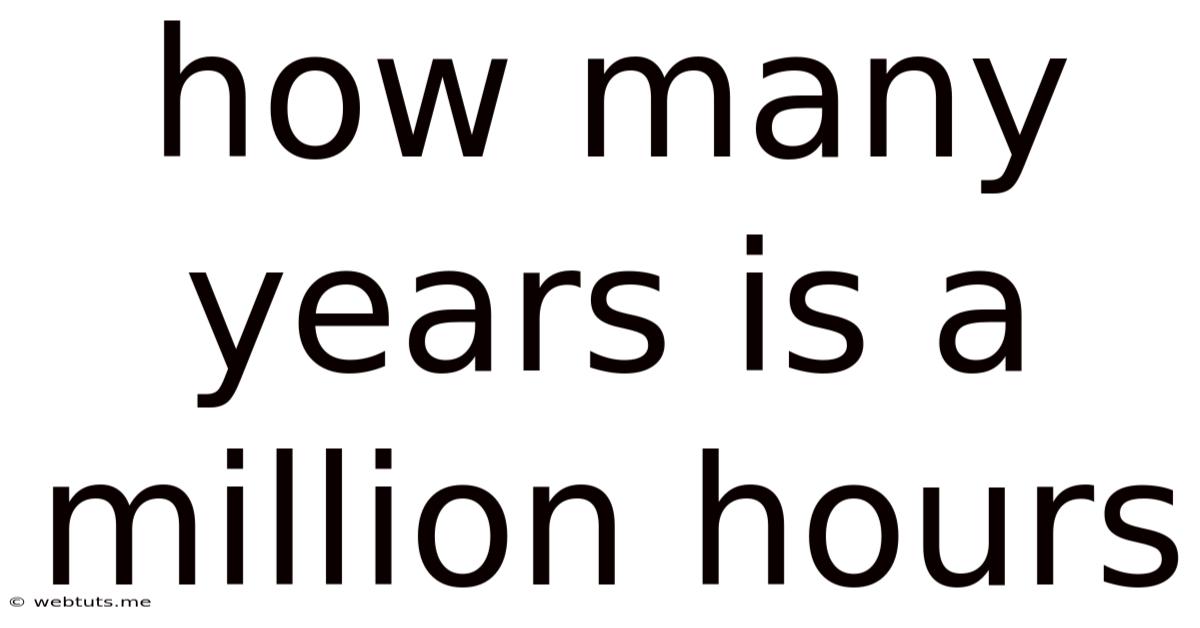How Many Years Is A Million Hours
Webtuts
May 11, 2025 · 4 min read

Table of Contents
How Many Years is a Million Hours? Unpacking the Immensity of Time
Have you ever considered just how long a million hours actually is? It's a number so vast it can be difficult to truly grasp. This article delves into the fascinating question of how many years constitute a million hours, exploring the calculations, offering relatable examples, and ultimately helping you conceptualize this monumental span of time.
Calculating a Million Hours into Years
The straightforward calculation is relatively simple: there are 24 hours in a day, and approximately 365.25 days in a year (accounting for leap years). Therefore, to convert a million hours into years, we can use the following formula:
1,000,000 hours / (24 hours/day) / (365.25 days/year) ≈ 114.077 years
Therefore, a million hours is roughly equivalent to 114 years. This is a significant amount of time, exceeding the lifespan of most individuals.
Breaking Down the Immensity: Relatable Examples
Understanding the sheer magnitude of a million hours requires relatable examples. Let's explore some scenarios to bring this immense timeframe into perspective:
A Lifetime of Experiences
Imagine spending a million hours pursuing a single passion. Whether it's mastering a musical instrument, perfecting a craft, or dedicated scientific research, the dedication required would be staggering. This timeframe would allow for profound expertise and remarkable achievement, spanning the majority of a human lifespan.
Career Dedication: A Million Hours at Work
Let's consider the average work week: a typical 40-hour work week. To accumulate a million hours of work, an individual would need to work for approximately:
1,000,000 hours / (40 hours/week) ≈ 25,000 weeks
Converting this to years, we get:
25,000 weeks / (52 weeks/year) ≈ 480.77 years
This illustrates that accumulating a million hours in a single career is simply not feasible within a single lifetime, highlighting the true enormity of a million hours.
Watching TV: A Million Hours of Entertainment
Consider the average person's daily TV viewing habits. Even modest viewing adds up significantly over time. Let’s assume an average of 2 hours of TV per day. This would mean it takes:
1,000,000 hours / (2 hours/day) ≈ 500,000 days
And converting this to years:
500,000 days / 365.25 days/year ≈ 1368.7 years
This shows how even relatively small daily activities, consistently performed, can accumulate to an astonishing total over a million hours.
Beyond the Calculation: The Qualitative Aspect of Time
While the mathematical calculation provides a precise numerical answer, it's crucial to acknowledge the qualitative aspect of time. A million hours isn't merely a numerical quantity; it's a vast expanse of experiences, memories, and changes. It's a timeframe capable of encompassing:
- Generational shifts: Multiple generations could come and go within a million hours. Family lineages would unfold, with significant social and cultural transformations occurring.
- Technological advancements: The pace of technological innovation is exponential. A million hours would witness unprecedented advancements, potentially transforming almost every facet of human life.
- Environmental changes: The impact of climate change and other environmental processes unfolds over vast timescales. A million hours would allow for the observation of substantial environmental changes.
- Personal growth and transformation: A million hours offers ample time for personal growth, learning, and evolution, encompassing numerous personal milestones and achievements.
A Million Hours: A Perspective on Life's Journey
The concept of a million hours encourages us to consider the vastness of time and the value of each moment. It underscores the importance of:
- Prioritization: With such a limited resource, effective prioritization becomes paramount.
- Purposeful living: Understanding the finite nature of time encourages a focus on meaningful pursuits and lasting contributions.
- Appreciation of the present: The immensity of a million hours highlights the preciousness of each moment and encourages us to savor the present.
Expanding on the Concept: Beyond a Million Hours
The concept of a million hours naturally leads to pondering even larger spans of time – a billion hours, a trillion hours. These numbers become increasingly challenging to comprehend, but exploring them further can provide a deeper understanding of the vastness of time and the scale of the universe.
Conclusion: Embracing the Immensity of Time
A million hours, translating to approximately 114 years, is a profoundly significant timeframe. By exploring relatable examples and considering the qualitative aspects of time, we can begin to grasp the true immensity of this period. It's a powerful concept that encourages reflection on the use of our time, the importance of purpose, and the preciousness of every moment within our finite lives. Understanding the true scale of a million hours fosters a deeper appreciation for the journey of life and the vastness of time itself. It inspires us to live more consciously, intentionally, and meaningfully, maximizing the impact of our limited time on this planet. This concept extends beyond mere calculation; it's a philosophical contemplation of existence and the passage of time. The journey of a million hours, while seemingly impossible to fully comprehend, provides a powerful framework for understanding the preciousness and vastness of life itself.
Latest Posts
Latest Posts
-
How Many Ounces In 1 9 Liters
May 12, 2025
-
How Many More Days Until October 7th 2024
May 12, 2025
-
How Many Days Till Feb 6 2024
May 12, 2025
-
How Many Days Until Febuary 9th
May 12, 2025
-
What Is 150 Days Before Feb 15 2025
May 12, 2025
Related Post
Thank you for visiting our website which covers about How Many Years Is A Million Hours . We hope the information provided has been useful to you. Feel free to contact us if you have any questions or need further assistance. See you next time and don't miss to bookmark.